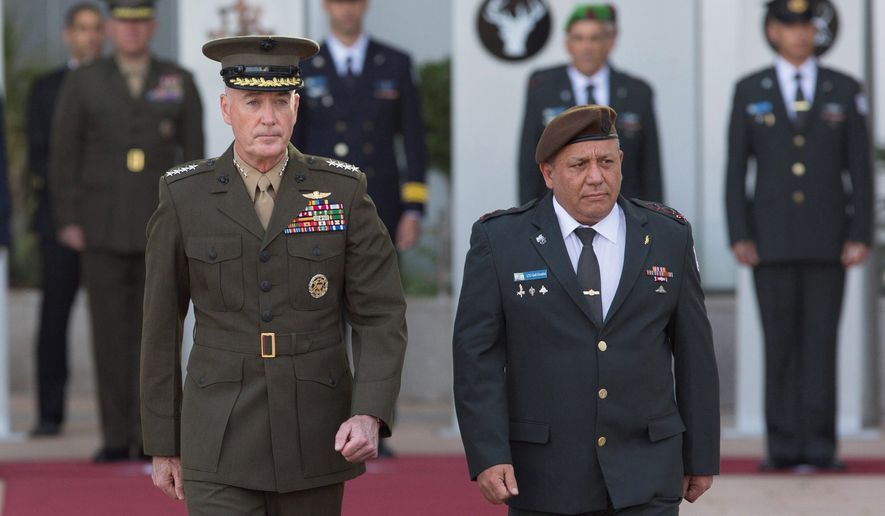The top U.S. commander in the Middle East made an unannounced visit to Israel on Tuesday, meeting with his Israeli counterpart amid growing worries in both Washington and Tel Aviv over the Syrian civil war and aggressive moves by Iran.
Tuesday’s meeting between U.S. Central Command chief Gen. Joseph L. Votel and Lt. Gen. Gadi Eizenkot, general chief of staff for the Israeli Defense Forces, comes as Israel has launched preemptive strikes against Iranian-backed paramilitary forces inside Syria, who have become more powerful as the government of Syrian ally President Bashar Assad has gained the upper hand against a collection of rebel groups.
The U.S. and Iran are both talking tough ahead of President Trump’s looming May 12 decision on whether to take Washington out of the 2015 Iran nuclear deal, a deal Israel also bitterly opposed.
Defense Department and command officials provided little detail on the purpose of Gen. Votel’s first visit to Israel, which was first revealed by Israeli press outlets.
“The general is conducting an official visit as the guest of the IDF Chief of the General Staff,” command spokesman Maj. Josh Jacques Told the Washington Times in a statement Tuesday. “During the visit, he will meet with senior military officials to increase military-to-military relations as well as to discuss security issues in the region.”
Making the trip even more noteworthy is the fact that the U.S. European Command, not Gen. Votel’s CENTCOM, typically coordinates the Pentagon’s operations in Israel.
But Defense Secretary James N. Mattis has worked toward forging a stronger relationship between Central Command and the Israeli military and security forces, one regional analyst said.
“For a long time, [the relationship] has been siloed” within European Command despite Israel’s position and influence in the Middle East, said Richard Goldberg, a former senior House foreign policy adviser specializing in the Middle East.
Under Mr. Mattis’ watch, the Pentagon has inked a memorandum of understanding between European and Central Commands concerning joint U.S.-Israeli operations, focusing specifically on the threat posed by Iran’s proxy forces in Syria and Lebanon, said Mr. Goldberg, now a senior regional analyst at the Washington-based Foundation for the Defense of Democracies.
That cooperation was on display during this year’s Juniper Cobra, the annual joint exercises between Israeli Defense Forces and American troops tied to Task Force Israel. While European Command officially led the military drill, units from CENTCOM also played an integral role in the exercise, Mr. Goldberg said.
Mr. Trump has said the U.S. military mission in Syria to defeat Islamic States, backing local Arab and Kurdish allies, has been largely achieved and he wants to bring American forces home.
But military planners worry that both Russia and Iran have expanded their influence inside Syria as the Islamic State has receded. The growing prominence of militias armed and trained by Iran’s Revolutionary Guards Corps, who along with Russian troops have backed Mr. Assad’s bloody campaign to crush rebel forces, has opened the door to the so-called “Shia Crescent” — Tehran’s long-sought land bridge linking Iran to Lebanon.
In the wake of the allied strike on Syria’s chemical weapons sites, Russia is considering its advanced anti-aircraft S-300 missile systems to Syria, amid reports Israel had directly asked the Kremlin not to approve the transfer. Russian Foreign Minister Sergei Lavrov said this week no final decision has been made.
Gen. Votel’s visit was a clear signal to Iran that the U.S. was closely monitoring the situation.
“You want that as a show of unity, as a show of defiance to Iran,” Mr. Goldberg said.
One option which could be under discussion between Washington and Tel Aviv is increasing U.S. support for overtly offensive airstrikes by Israeli warplanes against top-level Iranian military advisers working in Syria, Mr. Goldberg argued. Until now, U.S. forces have been restricted to taking military action against Islamic State targets only.
“We have not seen much targeted killing of leaders of the IRGC [in Syria],” Mr. Goldberg said. “That is a threshold that has not been crossed often” he added.
But should Iran use its new presence in Syria to pressure or intimidate Israel, that is a door Tel Aviv could open with Washington’s backing, he said.
Top Iranian advisers “should not be taking any selfies in Syria,” he said.
• Carlo Muñoz can be reached at cmunoz@washingtontimes.com.




Please read our comment policy before commenting.